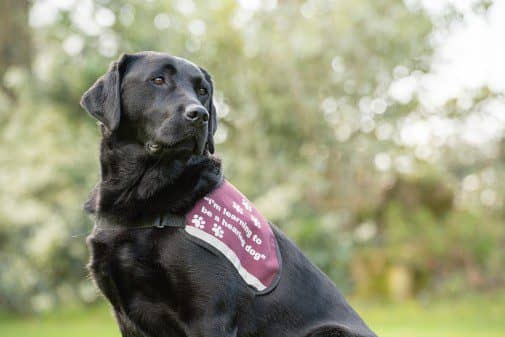The PEDRO study – led by the University of York – found that assistance dogs for deaf people significantly improve well-being, mental health, and independence, and reduce social isolation and fearfulness. An article detailing the results appears on the university’s website.
Related article: Humans ‘Perk Up Their Ears’ Similarly to Animals
The study is the first ever randomized controlled trial (RCT) investigating the impact of hearing dogs on people’s lives. It evaluated hearing dog partnerships created and supported by Hearing Dogs for Deaf People, the UK’s only hearing dog charity. The research was funded by the National Institute for Health Research’s School for Social Care Research.
More than 160 people with severe or profound hearing loss who had applied to the charity for a hearing dog took part in the research.
Well-being
The study showed that people who had received a hearing dog had significantly better mental well-being, were less dependent on others, and had fewer symptoms of anxiety and depression compared to those in the study still waiting for a hearing dog. They were also significantly less likely to feel isolated and fearful, either in the home or when out and about. In addition, those with a hearing dog had used fewer NHS and social care services.
Professor Bryony Beresford, the PEDRO study’s chief investigator from the Social Policy Research Unit based in the Department of Social Policy and Social Work said: “We know that hearing loss can negatively affect many aspects of people’s lives and, for people with severe hearing loss, hearing devices have limited impact. This means we need to know the best ways to support people as they live with hearing loss. This study provides, for the first time, robust evidence on the positive and wide-ranging impacts hearing dogs can make on people’s lives.
“This was a groundbreaking study. No one has previously used a randomized control trial to evaluate the impacts of hearing dogs on people’s lives, and within the world of assistance dogs more widely, trials are still incredibly rare. What this study has demonstrated is that this sort of research is possible. We would like to acknowledge the commitment of Hearing Dogs for Deaf People to ensuring the trial ran successfully.”
Companionship
Hearing dogs are trained to alert deaf people to sounds which are part of managing everyday life such as doorbells, a family member calling out, baby monitors, and alarm clocks. They are also trained to alert people to sounds which ensure people feel and stay safe such as smoke and intruder alarms. The dogs also provide companionship and emotional support. As assistance dogs, they have a legal right to accompany the individual into almost all spaces accessible by the public, including shops and healthcare settings.
Angie Platten, director of services at Hearing Dogs for Deaf People, said: “We see everyday the difference hearing dogs make to deaf children and adults, but there was very little in the way of strong scientific research to evidence this before the University of York carried out their independent study. It has really shone a light on why these dogs are so important – they make life better for so many people. This research is really exciting as it could also have wider implications in the way we measure the impacts of assistance dogs in the UK.”
Isolated
Graham Sage, 31, from Wallingford in Oxfordshire, who has a hearing dog, said: “Losing my hearing was scary. It made me feel unsafe, I couldn’t follow conversations easily and I became more introverted and felt quite isolated. My hearing dog Jovi has changed all that. He alerts me to sounds and he’s a huge part of my family. He’s made me feel more accepting, and even proud, of my hearing loss. He improved my mental well-being enormously and I can’t imagine my life without him. My wife Anna and I now have a little girl and it’s comforting to know Jovi can alert me to a baby’s cry and will add to the safety and security of our household.”
The study concluded that further research in this area is needed to determine the longer term impacts having a hearing dog can have.
The research team also included researchers from the University of York’s Centre for Health Economics and the York Trials Unit.
Source: University of York
Image: Paul Wilkinson, University of York





